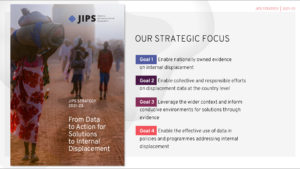The evidence we build on internal displacement is essential to design and implement effective and sustainable solutions. However, how this evidence is generated and used matters every bit as much as the evidence itself to drive positive change in displaced people’s lives and promote nationally owned solutions.
Jointly organized on 13 April 2021 by JIPS, the U.S. State Department’s Bureau of Population, Refugees and Migration (PRM), USAID’s Bureau for Humanitarian Assistance (BHA), and the Mission of Norway to the UN in Geneva, the event “Transforming Data into Action for Solutions to Internal Displacement” drew on reflections from the UN Secretary General’s High-Level Panel on Internal Displacement, recent achievements by the Expert Group on Refugee and IDP Statistics (EGRIS), and JIPS’ rich experience and expertise in this area.
https://www.youtube.com/watch?v=b8V7XoTW8t4
It highlighted how data has been a critical driver for change in internal displacement contexts such as Mexico, Somalia and Sudan, and namely in four key areas: ❶ incentivizing political will and building national ownership, ❷ ensuring responsible data management, ❸ fostering long-term collaboration across actors and disciplines, and ❹ elevating local engagement and capacity. The high-level speakers and leading experts from national governments and the international community also discussed key challenges that we will need to overcome in order to use data to its full potential for lasting solutions to internal displacement.
The event also marked the launch of JIPS’ new 3-year strategy, which outlines four strategic areas where data can be transformative when it is nationally and locally owned, as well as generated and used in a responsible and collaborative manner. Go to the event recording to listen again to the different interventions and the JIPS strategy presentation.

Check out our Strategy 2021-23 and strategy areas of work for this three-year period, and get in touch to work with us to make our vision – a world in which internally displaced persons can progress towards durable solutions and live in dignity while doing so – a reality.
Introductory remarks by event co-hosts